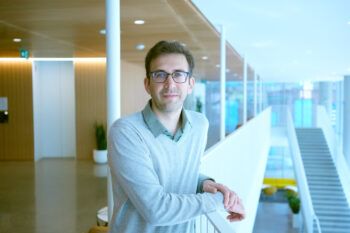Nine members of the U of T Engineering community have been inducted as fellows of the Canadian Academy of Engineering (CAE). Professors Robert Andrews (CivE), Sanjeev Chandra (MIE), Tom Chau (IBBME), Heather MacLean (CivE) and Wei Yu (ECE), along with alumni Perry Adebar (CivE MASc 8T7, PhD 9T0), Mark Hundert (IndE 7T1), Christopher Pickles (MMS 7T4, MASc 7T5, PhD 7T7) and John Young (MMS 7T1, MIE MASc 7T4) are among the CAE’s 50 new fellows. The CAE is a national institution through which Canada’s most distinguished and experienced engineers provide strategic advice on matters of critical importance to Canada. The new CAE fellows were inducted on June 26 in Ottawa, as part of the Academy’s Annual General Meeting and Symposium.
“The Academy’s recognition of so many faculty and alumni attests to the tremendous contributions U of T Engineers are making in Canada and around the world,” said Dean Cristina Amon. “It also demonstrates their impact in all aspects of the engineering profession — from engineering education to fundamental research to technology transfer, commercialization and consulting.”
Robert Andrews holds the NSERC Industrial Research Chair in Drinking Water Research, working with industry partners who serve over four million people in Southern Ontario. His collaborations with municipalities have allowed him to solve real-world problems that have a direct impact on the safety of Canada’s drinking water supply. An expert in drinking water treatment, Andrews is a member of several decision-making committees and advisory councils in Canada and the United States. His work has been recognized with prestigious awards from the Engineering Institute of Canada, the Canadian Society for Civil Engineering, and the American Water Works Association, among others.
Sanjeev Chandra is co-founder of the University of Toronto’s Centre for Coating Technologies, one of the world’s leading research centres in the area of thermal spray coatings. He has collaborated with research groups and industrial partners around the world in the development of cutting-edge technology in this area. Chandra’s work has been applied in the fields of spray coating and forming, spray cooling, ink jet printing, agricultural spraying and forensic science. He is a fellow of the American Association for the Advancement of Science, the American Society of Mechanical Engineers, and the Canadian Society for Mechanical Engineering, and received the NSERC Brockhouse Prize.
Through his research at Holland Bloorview and U of T, Tom Chau has developed assistive technologies which give children and youth with severe physical limitations the ability to communicate independently. Chau created the award-winning Virtual Music Instrument, which allows individuals with disabilities to express themselves through music. Additionally, he has pioneered optical brain-computer interfaces which allow nonverbal individuals to communicate through thought alone. Chau is a fellow of the American Institute for Medical and Biological Engineering and the recipient of several awards. In 2011 he was named one of 25 Transformational Canadians by The Globe and Mail.
Heather MacLean is an internationally recognized leader in sustainable systems analysis, including life cycle assessment and its application to energy systems and vehicles. Her work has led to sustainability assessment and life cycle assessment being viewed as critical tools by industry, government and other organizations, and has guided regulations such as California’s Low Carbon Fuel Standard. MacLean is an advisor to the World Bank/World Resources Institute for Sustainable Transportation. She is a fellow of the Engineering Institute of Canada and recipient of the Canada Mortgage and Housing Corporation Excellence in Education Award for Promotion of Sustainable Practices.
Wei Yu has made highly influential contributions to the field of information theory and communication engineering. His research addresses fundamental limits of information transmission in communication networks. Yu proposed dynamic spectrum management methods that have been used in millions of digital subscriber lines worldwide and also contributed significantly to the capacity analysis and optimization techniques for multiuser multiple-input multiple-output (MIMO) wireless communication channels, which are widely used in cellular networks. Professor Yu is an IEEE fellow, recipient of the NSERC E.W.R. Steacie Memorial Fellowship, and a Thompson Reuters Highly Cited Researcher.
Perry Adebar has made important contributions to the profession and practice of engineering in Canada. An award-winning educator, he is known for presenting a strong connection between theory and engineering practice, and his views are highly respected by industry. He is head of UBC Civil Engineering, and was previously associate dean of Applied Science at UBC. His research has had a direct impact on the seismic design of high-rise concrete buildings in Canada. Professor Adebar has provided engineering advice to several consulting engineering firms. He is a director of the Structural Engineers of B.C. and a member of the Canada TF-1 HUSAR Team.
Mark Hundert is a pioneer in the application of industrial engineering and operations research practices in order to improve the delivery of health care in Canada. He has helped to introduce principles and methodologies to improve the efficiency and effectiveness of our hospitals and other health care organizations. Among his many contributions in this field, Hundert spearheaded the development of a national database benchmarking the efficiency and quality of care in Canadian hospitals, which has been an essential tool in identifying and addressing areas needing improvement in the Canadian health care system. He received the Ontario Professional Engineers Management Medal in 2008.
A leading authority on microwave heating for metallurgical applications, Christopher Pickles has been a pioneer in the development of microwaves for processing ores, precious metal residues, and waste materials. Other major contributions include the use of extended arc plasma reactors for the treatment of electric furnace dusts and generation of ferro-alloys. Professor Pickles has presented short courses for industry, mentored close to 70 researchers, published over 170 papers, coedited five conference volumes and coauthored a textbook on Chemical Metallurgy. He is a fellow of the Canadian Institute of Mining, Metallurgy and Petroleum and has won national awards.
John Young has been eminently successful in the generation and application of new knowledge associated with primary steelmaking operations. He has provided exceptional engineering leadership in simulation modelling and commissioning of numerous steelmaking plants within Canada and abroad. He has coauthored a textbook entitled “Metallurgical Plant Design” and made significant contributions to the training of engineers in industry, as well as engineering students at both McGill and U of T, where he serves as an adjunct lecturer and instructor for MSE 450: Plant Design for Materials Process Industries. Throughout his career, Young has been an excellent ambassador for the engineering profession. He has received a number of high profile awards from AIME’s Iron and Steel Society.



